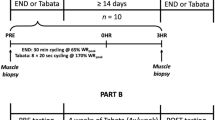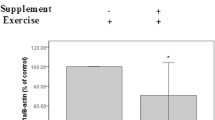Abstract.
We evaluated the effects of testosterone overload on mitochondrial superoxide dismutase (MnSOD), cytochrome oxidase (COX) and citrate synthase (CS) activities of the rat superficial gastrocnemius both in non-exercised muscle and following moderate endurance training. Basal (bLPO) and stimulated (sLPO) lipid peroxidation was measured as an index of oxidative tissue damage. Furthermore, to assess the relationship between exercise and testosterone-induced metabolic adaptations and contractile protein expression, the distribution of myosin heavy chain (MHC) isoforms was analysed by SDS-PAGE. Samples were obtained from: controls (C), rats treated with testosterone propionate (Tp) (TP, 5 mg kg–1 i.m. 6 days/week), trained rats (E, 5 days/week) and rats trained and treated with Tp (ETP). MnSOD significantly increased in E and TP in comparison with C and ETP. Training induced a significant increase in COX activity both in E and ETP whereas a statistical reduction was observed in TP in comparison with the other groups. Moreover, testosterone administration was associated with a significant reduction in CS activity which significantly increased in ETP. A reduction in lipid peroxidation was observed in E and ETP in comparison with controls both in basal and stimulated conditions, whereas TP showed a significant increase of bLPO. In trained rats enzymatic changes were correlated with an increase in the proportion of fast oxidative MHC-2A and MHC-2X with decrease of the proportion of fast MHC-2B. In contrast, Tp treatment induced an increase in the proportion of MHC-2B whereas MHC-2A and MHC-2X disappeared. Finally, ETP showed a reduction in MHC-2B and an increase in MHC-1 and MHC-2X. These data suggest that testosterone supplementation seems not to significantly modify the metabolic adaptation induced by exercise in gastrocnemius muscle. Furthermore, testosterone overload to non-exercised rats seems to reduce the mitochondrial function and increase the lipid peroxidation of the muscle.
Similar content being viewed by others
Author information
Authors and Affiliations
Additional information
Electronic Publication
Rights and permissions
About this article
Cite this article
Pansarasa, O., D'Antona, G., Gualea, M. et al. "Oxidative stress": effects of mild endurance training and testosterone treatment on rat gastrocnemius muscle. Eur J Appl Physiol 87, 550–555 (2002). https://doi.org/10.1007/s00421-002-0668-3
Accepted:
Issue Date:
DOI: https://doi.org/10.1007/s00421-002-0668-3




